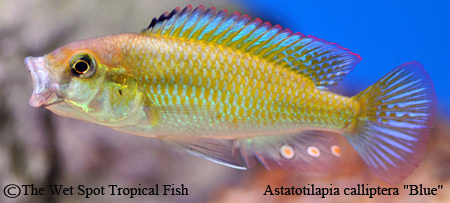Description
Geographic Range: Astatotilapia calliptera is found in various freshwater habitats across Africa, including rivers, lakes, and streams in countries such as Uganda, Kenya, and Tanzania.
Diet:
Astatotilapia calliptera is omnivorous, feeding on a variety of foods in the wild, including algae, small invertebrates, and plant matter.
In captivity, they should be fed a varied diet consisting of high-quality pellets or flakes designed for cichlids, supplemented with occasional live or frozen foods such as bloodworms, brine shrimp, and vegetable matter.
Average Adult Size:
Adult Astatotilapia calliptera typically reach sizes ranging from 4 to 6 inches (10 to 15 centimeters), depending on the specific subspecies and environmental conditions.
Minimum Tank Size:
A minimum tank size of 30 gallons is recommended for a small group of Astatotilapia calliptera.
Larger tanks with plenty of swimming space and hiding spots are preferred, especially for keeping multiple specimens or for providing territories.
Temperament:
Astatotilapia calliptera is generally peaceful compared to many other African cichlids, but they can still be territorial, especially during breeding.
They can be kept in a community tank with other similarly sized and temperamented fish, but aggression should be monitored, especially during breeding periods.
Recommended Water Parameters:
pH: 7.0-8.0
Temperature: 72-78°F (22-26°C)
Hardness: Astatotilapia calliptera can tolerate a wide range of water hardness, but they prefer slightly hard water with a dH range of 5-15.
Ammonia: Should be maintained at zero ppm (parts per million).
Nitrite: Should be maintained at zero ppm.
Nitrate: Keep nitrate levels below 20 ppm through regular water changes and efficient filtration.

